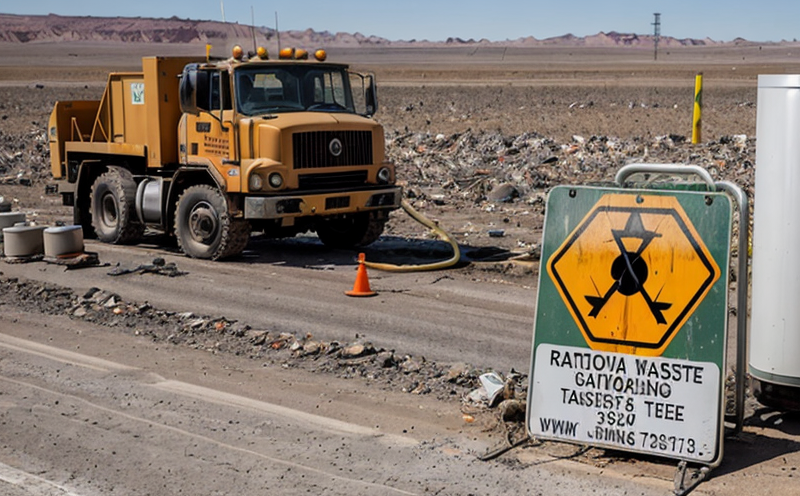ISO 17025 Laboratory Accreditation for Waste Analysis Testing
The ISO/IEC 17025 accreditation is a hallmark of excellence in laboratory testing and calibration. This certification ensures that the laboratory adheres to internationally recognized standards for competence, quality, and reliability in waste analysis testing. For industries dealing with radioactive materials, such as nuclear energy, healthcare facilities, and research institutions, ISO/IEC 17025 accreditation is not just a compliance requirement; it's an essential tool for ensuring safety, regulatory compliance, and the integrity of test results.
The process of obtaining this accreditation involves rigorous internal audits, continuous quality improvement, and adherence to stringent technical requirements. It covers all aspects of waste analysis testing, from sample preparation and handling through to final reporting. Laboratories that achieve ISO/IEC 17025 accreditation demonstrate a commitment to maintaining the highest standards in their operations.
For radioactive waste testing specifically, this accreditation ensures that laboratories can accurately characterize and analyze hazardous materials, ensuring compliance with international regulations such as IAEA (International Atomic Energy Agency) guidelines. The use of advanced analytical techniques and adherence to strict safety protocols are key components of ISO/IEC 17025 accreditation.
The accreditation process also involves proficiency testing, where laboratories must demonstrate their capability to conduct accurate tests by participating in external quality assurance programs. This ensures that the results produced are reliable and consistent across different testing conditions and environments.
For industries relying on radioactive waste analysis for regulatory compliance or R&D purposes, ISO/IEC 17025 accreditation provides a layer of trust and reliability. It helps to mitigate risks by ensuring that all tests are conducted in a controlled, standardized manner, thus reducing the potential for errors and enhancing safety standards.
The benefits extend beyond mere compliance; they include enhanced credibility with stakeholders, improved efficiency through streamlined processes, and the ability to offer more robust data to support decision-making. This accreditation is particularly important when dealing with radioactive materials, as it ensures that all testing practices meet the highest international standards.
Scope and Methodology
| Parameter | Description |
|---|---|
| Safety Protocols | Comprehensive safety measures are implemented to protect personnel, the environment, and equipment. |
| Sample Handling | Strict protocols for sample collection, transport, storage, and preparation ensure accuracy in analysis. |
| Analytical Techniques | A variety of advanced analytical techniques are employed to characterize radioactive waste accurately. |
| Data Reporting | Comprehensive reports that include all relevant data points ensuring transparency and traceability. |
| Parameter | Description |
|---|---|
| Quality Assurance | Involves regular internal audits and proficiency testing to ensure consistent performance. |
| Training | Continuous training programs for staff to stay abreast of the latest methodologies and technologies. |
| Certification Requirements | Adherence to ISO/IEC 17025 standards, ensuring world-class competence in testing. |
| Regulatory Compliance | Compliance with international regulations such as IAEA guidelines for radioactive materials. |
Eurolab Advantages
EuroLab, a leading provider of ISO/IEC 17025 accredited laboratory services for waste analysis testing, offers unparalleled expertise in the field. Our team of highly qualified professionals ensures that every test conducted meets the highest standards of accuracy and reliability.
Our state-of-the-art facilities are equipped with cutting-edge technology to support comprehensive radioactive waste characterization. This includes advanced spectrometers, gamma ray detectors, and other specialized equipment designed to handle the most challenging samples.
EuroLab's commitment to quality is reflected in our rigorous accreditation process, which involves regular external audits and continuous improvement initiatives. Our laboratory staff are trained to the highest standards and undergo regular certification to ensure they remain up-to-date with the latest methodologies and technologies.
In addition to technical excellence, EuroLab prides itself on providing exceptional customer service. We understand that timely and accurate results are critical for our clients' operations, which is why we offer expedited testing options tailored to meet their specific needs.
Our reputation for reliability and accuracy has made us a trusted partner in the industry. Clients can rest assured knowing that EuroLab will provide them with robust data that can be used to make informed decisions regarding radioactive waste management.
Customer Impact and Satisfaction
EuroLab's ISO/IEC 17025 accredited laboratory services have a significant impact on the operations of our clients. By ensuring that waste analysis testing is conducted to the highest standards, we help our customers meet regulatory requirements and improve operational efficiency.
Our clients benefit from accurate and reliable data, which allows them to make informed decisions regarding radioactive waste management. This can lead to cost savings through optimized processes and reduced environmental impact. In addition, compliance with international regulations is essential for maintaining a safe working environment and avoiding potential legal issues.
EuroLab's commitment to quality has earned us high levels of customer satisfaction. Our clients appreciate our prompt service and the robust data we provide. We strive to exceed expectations by offering tailored solutions that meet each client's unique needs.
By choosing EuroLab for their ISO/IEC 17025 accredited laboratory services, our clients can be confident in the quality of their results. This ensures they are making informed decisions regarding radioactive waste management, which is critical for maintaining safety and regulatory compliance.





